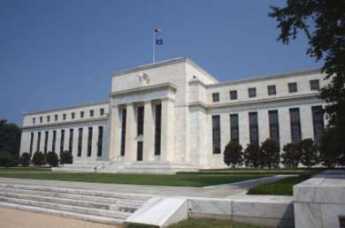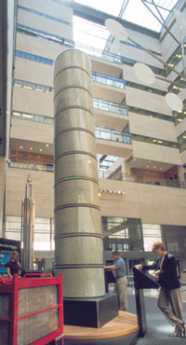Related Topics
Dislocations: Financial and Fundamental
The crash of 2007 was more than a bank panic. Thirty years of excessive borrowing had reached a point where something was certain to topple it. Alan Greenspan deplored "irrational exuberance" in 1996, but only in 2007 did everybody try to get out the door at the same time. The crash announced the switch to deleveraging, it did not cause it.
Philadelphia Changes the Nature of Money
Banking changed its fundamentals, on Third Street in Philadelphia, three different times.
Bye, Bye, Banks

|
| Fort Knox |
Banking is a comparatively recent invention; in its present form, it's only a couple of centuries old. Paper certificates circulated as money, representing precious metals like gold and silver in the bank vaults, eventually concentrated in Fort Knox as Federal Reserves. When the economy grew faster than the supply of gold, silver was also monetized, then diluted by only partial reserving. Finally a couple of decades ago we abandoned precious metal reserving entirely, and resorted to partial reserving leveraged to a virtual concept known as Federal Reserves whose quantity depended on the behavior of American inflation. Almost the whole world soon depended on the American Federal Reserve to stand behind its virtual dollars, formerly redeemable in gold or silver, but now based on inflation targeting. That is, the Fed sets a target of something like 2% inflation a year, and either absorbs currency or floods the world with currency, sufficient to maintain a steady match to the target. It's a little uncomfortable to see the standard of measurement shifting, from inflation as most people understand it, to "core" inflation, which subtracts the cost of food and oil. Especially oil. It's additionally disquieting to realize that the Fed is dependent on its own computers, reading other people's computers, all subject to the frailties of computers. to determine the degree of match to the target. We sort of got into this fix because the supply of precious metals was inelastic; perhaps the present expedient could become a little too elastic because it is so heavily dependent on vast streams of computerized information. Garbage in, garbage out?

|
| Federal Reserve Bank |
Meanwhile, banks simply had to surrender to the obvious efficiencies of using electronic stored-program calculators. Paper checks, canceled checks, and bank tellers are consequently disappearing. Banks themselves are disappearing, as anyone can see by looking at the abandoned stone tombs on America's main streets. At the moment, the process is one of concentration of smaller banks into bigger ones; eventually, there will be some kind of transformation of the way they conduct business to a point where banking could effectively disappear. Who needs banks, anyway? One significant answer to that question is that, the Federal Reserve Bank needs them. And the rest of us need the Federal Reserve because that's how the value of money is determined nowadays.

|
| Federal Reserve |
Customers, however, don't need banks for deposits; money market funds pay higher interest rates. There's no need for banks to provide loans; credit cards do that for small borrowers, while big borrowers float bonds through an investment banker. Bank vaults may be useful to store grandmother's pearl necklace, but no one needs vaults to store securities, which are now mainly held as bookkeeping entries in "street" name. People used banks for the origination of mortgages, but other institutions could serve as well. Anyway, home mortgage origination is what broke down in August 2007, when banks eluded Federal Reserve lending constraints by selling mortgages to subsidiary corporations they often owned. To repeat, we need banks because the Federal Reserve needs banks to control the currency, through regulating loan volume, which is achieved by regulating the number of reserves that banks are required to maintain. Reflect on how that matters to currency.
Before a bank makes a loan, only the depositor owns the money in question. After a loan is made, two people have a claim on the money, the borrower and the depositor. Although there is a fine distinction between money and credit, between money and liquidity, the real point is that making a loan effectively doubles the money. If a bank is then only required to keep half of its total loan volume in reserve, the money in circulation is multiplied four times what it was, and so on. Loan volume is also controlled by its scarcity value, which is indirectly affected by setting short-term interest rates. Unfortunately, cheaper money is worthless -- the dollar goes down in relation to the currency of the rest of the world. There are probably other ways which could be devised to control the currency, but a time of frozen credit markets is a dangerous time to consider radical changes in the currency. If the Fed is forced to make such changes, they had better be correct.
It's unfortunately also true that radical changes can only be made when people are scared stiff by a crisis. Is it entirely out of the question that we may soon need to scrap the Federal Reserve system? Just think back to the bitterness when Hamilton and Jefferson, later followed by Biddle and Jackson, fought about whether central banks were necessary at all. Or, more recently in 1913, when Wall Street and the Progressive movement fought about whether there was a need to create a Federal Reserve. Disputes about financial matters have been at the core of most political party disputes, since the founding of the Republic. Decisions made in the past have not always been the right ones. Nevertheless, since the banks anyway appear to be on a long slow slope to extinction as a result of the computers that briefly made them prosperous, maybe we should revise the way the Federal Reserve controls currency. Without the Fed to defend them, banks' prospects look bleak.
Originally published: Wednesday, December 26, 2007; most-recently modified: Wednesday, May 15, 2019